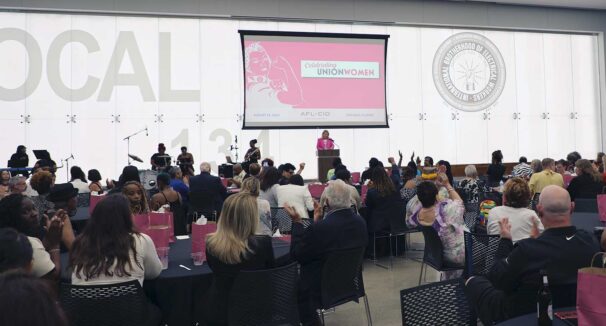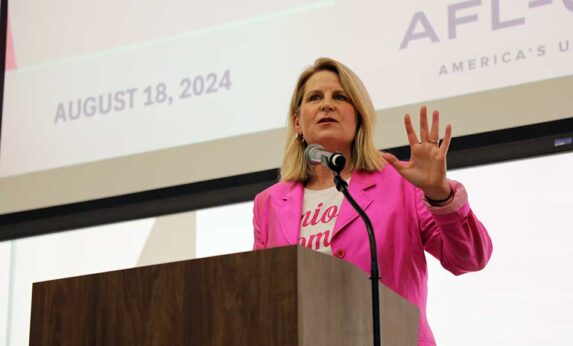
CHICAGO—The AFL-CIO is sending dozens of new organizers to live and work full-time in aiding workers in the Deep South states of Georgia, Florida, and South Carolina as part of its drive to add a million new members, net, within the next several years, federation President Liz Shuler says.
In a brief interview at a reception in Chicago just before the Democratic National Convention opened there, Shuler listed several reasons for the emphasis.
“We feel unions are taking root there” despite the decades-long hate of unions by the Southern ruling class of both corporate heads and politicians, she said. Shuler also noted it’s ripe for organizing, as the fastest-growing, but also the poorest, U.S. region.
And Democratic President Joe Biden’s administration has awarded millions of dollars in federal “seed money” to construction of semi-conductor factories in swing state Arizona and reddish Ohio, as well as deep blue New York.
“And we’ll go after unionizing wind farms and solar energy” creators, Shuler said. “That’s where the jobs are under other legislation Biden pushed, labor lobbied for and Congress approved.
The federation and other unions still face that hate, despite some recent wins, notably the Steel Workers unionizing the Blue Bird school bus construction company in rural Georgia. But much more common is the politicians’ anti-union unity when the UAW campaigned to unionize the Mercedes-Benz plant in Alabama.
Five other Deep South governors joined Alabama’s right-wing Republican Kay Ivey in declaring unions an economic threat to their states, to Mercedes’ continued operation, and to the so-called Southern way of life. Uttering that threat to close Mercedes if it unionized actually breaks the law which forbids those with power over workers from attacking their right to organize. The governors uttered the threat on behalf of the employers. The UAW lost that recognition vote.

As might be expected with a Democratic convention about to officially open, the reception honoring path-breaking union women was held in Electrical Workers Local 134’s hall on Chicago’s South Side. The IBEW is Shuler’s home union and she spoke about her first organizing drive, in her hometown of Portland, Ore.
Shuler tried to organize the clerical workers in her IBEW local because she saw the pay difference between men and women doing the same jobs. She lost, and the workers still aren’t organized.
Her point is the IBEW membership is now half female and that the labor movement “is the largest organization of women in the country.” Federal estimates, from the Bureau of Labor Statistics, reported that as of last year, the latest data available, 7.847 million men and 6.577 million women were union members.
Politically, Shuler told the crowd, “We’re going to have more people sign up” during the convention “for a day of action in Pennsylvania, Wisconsin, and Nevada,” all key swing states in this year’s presidential race. “Do everything you can.”
Do everything you can to get another person to the polls, another five people to the polls, another ten people to the polls,” she urged the crowd. “Then we’ll put Kamala Harris in the White House. In the swing states, labor movement women are plus 15 percentage points for Harris. Other women are minus 2.” Shuler did not cite a source for the numbers.
“Do that and we’ll make ‘herstory.’”
The session turned into a celebration of powerful women, including Shuler, Gov. Maura Healey, D-Mass., Wisconsin AFL-CIO Secretary-Treasurer Stephanie Bloomingdale, and new Service Employees President April Verrett—and the labor movement’s strong support of Democratic Vice President Harris’s nomination for the presidency.
But it’s not just an individual effort, Shuler declared. “Black women marched, and it proved women in this country can stand together, fight together, make progress together, and win together. They did what” unnamed others “said they couldn’t do.”
Left unsaid: Black women were the key to Democratic President Joe Biden’s primary victory in South Carolina four years ago. After losses in New Hampshire and Iowa, his candidacy was on the ropes. That South Carolina win brought him an avalanche of support nationwide which eventually landed him in the White House.

“Black women are organizing and people don’t realize this, but the labor movement is the largest organization of women in the country,” Shuler said.
All the speakers at the gala emphasized the same theme Harris does: Looking forward, not back.
In an interview after the talk, Bloomingdale was optimistic Harris would carry Wisconsin. The most recent poll in that key swing state gives her a nine-percentage point lead over increasingly erratic Donald Trump, a convicted felon and the Republican nominee. “People are energized around electing Harris and Walz,” the Minnesota governor who is her running mate. “People want to continue to have pro-union leadership that is really strong,” she said.
Bloomingdale, while admitting it would be “a tough battle,” also believes Democrats can retake the state Assembly. The GOP holds a veto-proof 63-36 majority there thanks to one of the worst cases of lopsided gerrymandering in the U.S.
But now court rulings forced the lawmakers to draw a new, fairer map, which Democratic Gov. Tony Evers signed into law. “The new maps give us a chance to have a working majority in the State Assembly,” she said. A chance to retake the state Senate occurs in two years.
“This election is not about what just happens in November, but about what happens after November. So it is incumbent upon us not to make elections about individuals but about issues. And to make sure that the nine in 10 workers that don’t now have a union get a union,” said Verrett, who earned her organizing chops in Chicago and California.
Otherwise, “People cannot keep a roof over their heads because of corporate greed.” But she also warned repairing the damage would take a while.
“We can’t undo” immediately “the damage that has been done for 400 years,” said Verrett, who is African-American. But to make a start on that task means “we need a younger, fresher labor movement.”
Correction: When originally published, this article’s headline mistakenly listed Texas rather than Florida as one of the three states being targeted by labor.










